Financial Reporting Analysis: Cash Flow, Standards, and Stakeholders
VerifiedAdded on 2020/07/23
|6
|1302
|30
Report
AI Summary
This report provides an in-depth analysis of financial reporting, focusing on the statement of cash flows and its significance to various stakeholders, including investors, employees, and customers. The report examines the importance of liquidity and solvency assessments for stakeholders. It also critically analyzes different accounting standards, specifically comparing rule-based and principle-based approaches, with a focus on their implications for businesses like Tesco PLC. The analysis covers how accounting standards in the US and internationally, such as GAAP and IFRS, influence financial reporting practices, and provides a conclusion on the effective use of financial reporting in business by adhering to established standards. The report utilizes various academic sources to support its findings, including books and journals on accounting and financial reporting.

Financial Reporting
Paraphrase This Document
Need a fresh take? Get an instant paraphrase of this document with our AI Paraphraser
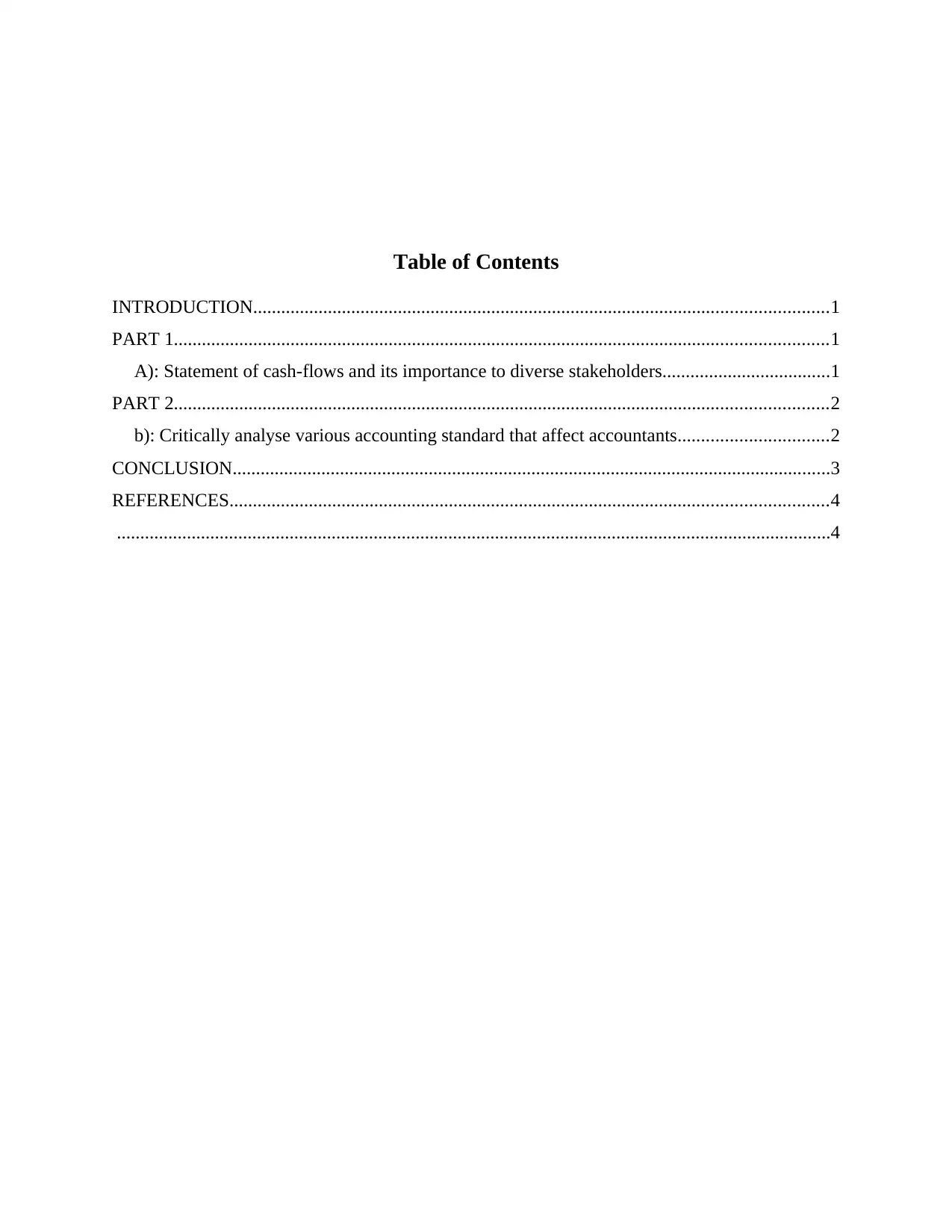
Table of Contents
INTRODUCTION...........................................................................................................................1
PART 1............................................................................................................................................1
A): Statement of cash-flows and its importance to diverse stakeholders....................................1
PART 2............................................................................................................................................2
b): Critically analyse various accounting standard that affect accountants................................2
CONCLUSION................................................................................................................................3
REFERENCES................................................................................................................................4
.........................................................................................................................................................4
INTRODUCTION...........................................................................................................................1
PART 1............................................................................................................................................1
A): Statement of cash-flows and its importance to diverse stakeholders....................................1
PART 2............................................................................................................................................2
b): Critically analyse various accounting standard that affect accountants................................2
CONCLUSION................................................................................................................................3
REFERENCES................................................................................................................................4
.........................................................................................................................................................4
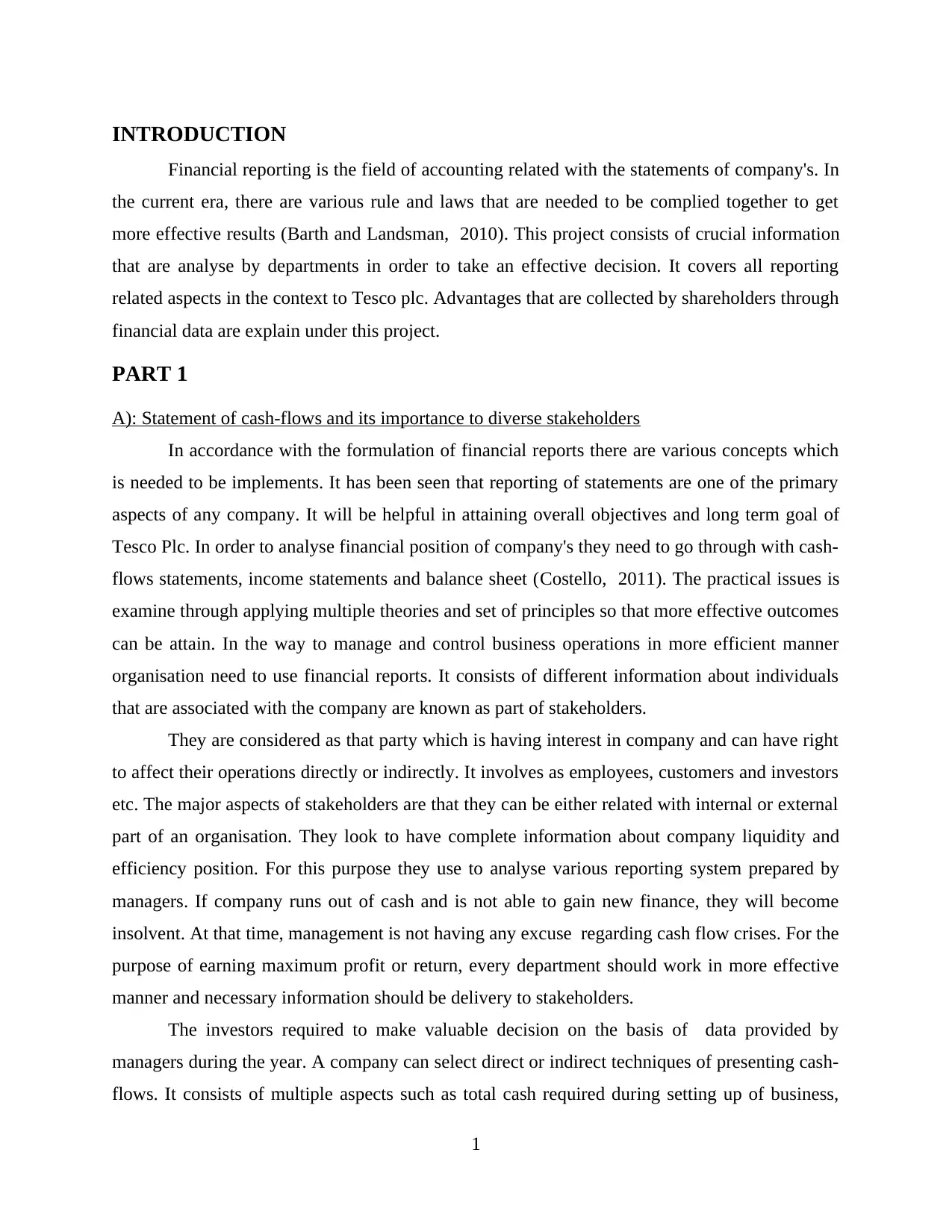
INTRODUCTION
Financial reporting is the field of accounting related with the statements of company's. In
the current era, there are various rule and laws that are needed to be complied together to get
more effective results (Barth and Landsman, 2010). This project consists of crucial information
that are analyse by departments in order to take an effective decision. It covers all reporting
related aspects in the context to Tesco plc. Advantages that are collected by shareholders through
financial data are explain under this project.
PART 1
A): Statement of cash-flows and its importance to diverse stakeholders
In accordance with the formulation of financial reports there are various concepts which
is needed to be implements. It has been seen that reporting of statements are one of the primary
aspects of any company. It will be helpful in attaining overall objectives and long term goal of
Tesco Plc. In order to analyse financial position of company's they need to go through with cash-
flows statements, income statements and balance sheet (Costello, 2011). The practical issues is
examine through applying multiple theories and set of principles so that more effective outcomes
can be attain. In the way to manage and control business operations in more efficient manner
organisation need to use financial reports. It consists of different information about individuals
that are associated with the company are known as part of stakeholders.
They are considered as that party which is having interest in company and can have right
to affect their operations directly or indirectly. It involves as employees, customers and investors
etc. The major aspects of stakeholders are that they can be either related with internal or external
part of an organisation. They look to have complete information about company liquidity and
efficiency position. For this purpose they use to analyse various reporting system prepared by
managers. If company runs out of cash and is not able to gain new finance, they will become
insolvent. At that time, management is not having any excuse regarding cash flow crises. For the
purpose of earning maximum profit or return, every department should work in more effective
manner and necessary information should be delivery to stakeholders.
The investors required to make valuable decision on the basis of data provided by
managers during the year. A company can select direct or indirect techniques of presenting cash-
flows. It consists of multiple aspects such as total cash required during setting up of business,
1
Financial reporting is the field of accounting related with the statements of company's. In
the current era, there are various rule and laws that are needed to be complied together to get
more effective results (Barth and Landsman, 2010). This project consists of crucial information
that are analyse by departments in order to take an effective decision. It covers all reporting
related aspects in the context to Tesco plc. Advantages that are collected by shareholders through
financial data are explain under this project.
PART 1
A): Statement of cash-flows and its importance to diverse stakeholders
In accordance with the formulation of financial reports there are various concepts which
is needed to be implements. It has been seen that reporting of statements are one of the primary
aspects of any company. It will be helpful in attaining overall objectives and long term goal of
Tesco Plc. In order to analyse financial position of company's they need to go through with cash-
flows statements, income statements and balance sheet (Costello, 2011). The practical issues is
examine through applying multiple theories and set of principles so that more effective outcomes
can be attain. In the way to manage and control business operations in more efficient manner
organisation need to use financial reports. It consists of different information about individuals
that are associated with the company are known as part of stakeholders.
They are considered as that party which is having interest in company and can have right
to affect their operations directly or indirectly. It involves as employees, customers and investors
etc. The major aspects of stakeholders are that they can be either related with internal or external
part of an organisation. They look to have complete information about company liquidity and
efficiency position. For this purpose they use to analyse various reporting system prepared by
managers. If company runs out of cash and is not able to gain new finance, they will become
insolvent. At that time, management is not having any excuse regarding cash flow crises. For the
purpose of earning maximum profit or return, every department should work in more effective
manner and necessary information should be delivery to stakeholders.
The investors required to make valuable decision on the basis of data provided by
managers during the year. A company can select direct or indirect techniques of presenting cash-
flows. It consists of multiple aspects such as total cash required during setting up of business,
1
⊘ This is a preview!⊘
Do you want full access?
Subscribe today to unlock all pages.

Trusted by 1+ million students worldwide
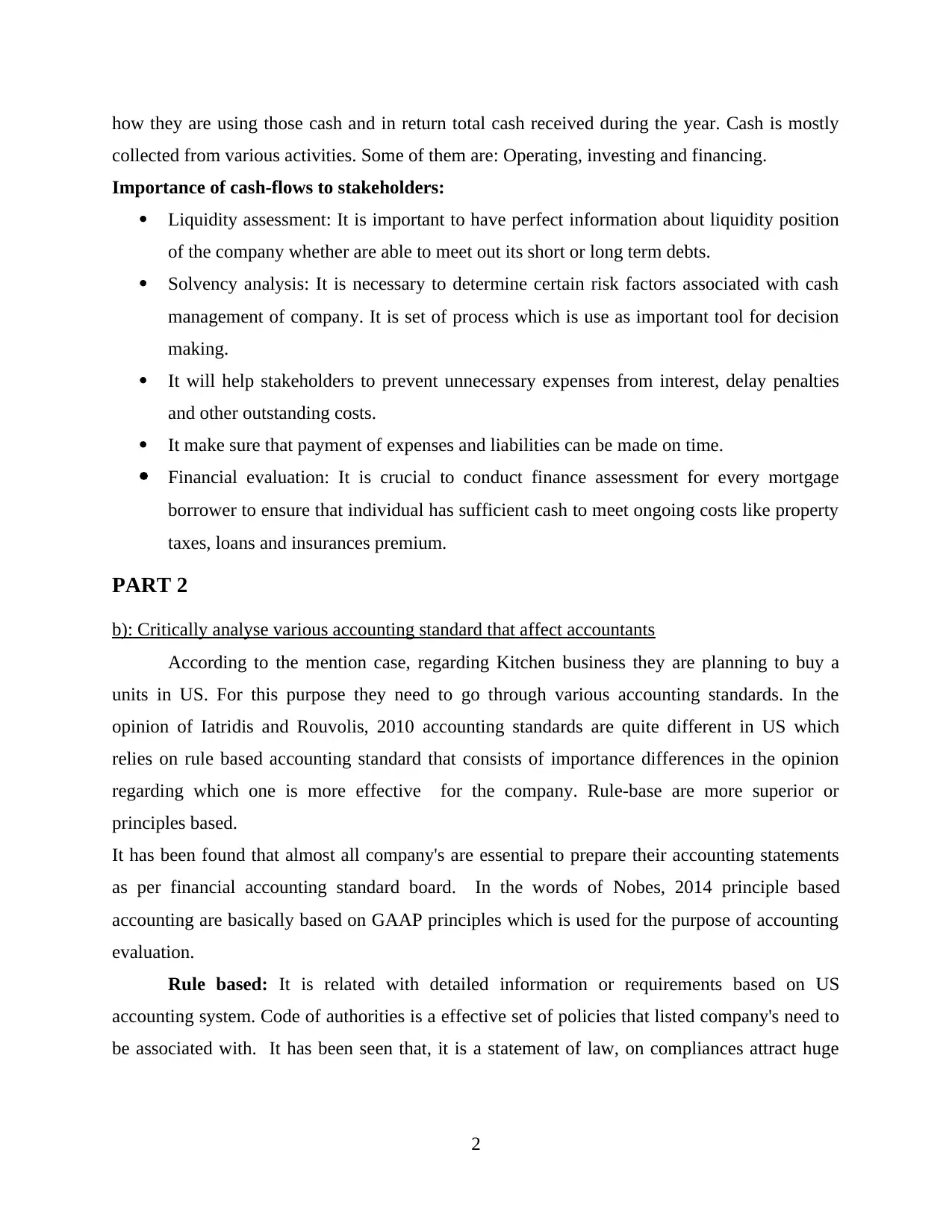
how they are using those cash and in return total cash received during the year. Cash is mostly
collected from various activities. Some of them are: Operating, investing and financing.
Importance of cash-flows to stakeholders:
Liquidity assessment: It is important to have perfect information about liquidity position
of the company whether are able to meet out its short or long term debts.
Solvency analysis: It is necessary to determine certain risk factors associated with cash
management of company. It is set of process which is use as important tool for decision
making.
It will help stakeholders to prevent unnecessary expenses from interest, delay penalties
and other outstanding costs.
It make sure that payment of expenses and liabilities can be made on time.
Financial evaluation: It is crucial to conduct finance assessment for every mortgage
borrower to ensure that individual has sufficient cash to meet ongoing costs like property
taxes, loans and insurances premium.
PART 2
b): Critically analyse various accounting standard that affect accountants
According to the mention case, regarding Kitchen business they are planning to buy a
units in US. For this purpose they need to go through various accounting standards. In the
opinion of Iatridis and Rouvolis, 2010 accounting standards are quite different in US which
relies on rule based accounting standard that consists of importance differences in the opinion
regarding which one is more effective for the company. Rule-base are more superior or
principles based.
It has been found that almost all company's are essential to prepare their accounting statements
as per financial accounting standard board. In the words of Nobes, 2014 principle based
accounting are basically based on GAAP principles which is used for the purpose of accounting
evaluation.
Rule based: It is related with detailed information or requirements based on US
accounting system. Code of authorities is a effective set of policies that listed company's need to
be associated with. It has been seen that, it is a statement of law, on compliances attract huge
2
collected from various activities. Some of them are: Operating, investing and financing.
Importance of cash-flows to stakeholders:
Liquidity assessment: It is important to have perfect information about liquidity position
of the company whether are able to meet out its short or long term debts.
Solvency analysis: It is necessary to determine certain risk factors associated with cash
management of company. It is set of process which is use as important tool for decision
making.
It will help stakeholders to prevent unnecessary expenses from interest, delay penalties
and other outstanding costs.
It make sure that payment of expenses and liabilities can be made on time.
Financial evaluation: It is crucial to conduct finance assessment for every mortgage
borrower to ensure that individual has sufficient cash to meet ongoing costs like property
taxes, loans and insurances premium.
PART 2
b): Critically analyse various accounting standard that affect accountants
According to the mention case, regarding Kitchen business they are planning to buy a
units in US. For this purpose they need to go through various accounting standards. In the
opinion of Iatridis and Rouvolis, 2010 accounting standards are quite different in US which
relies on rule based accounting standard that consists of importance differences in the opinion
regarding which one is more effective for the company. Rule-base are more superior or
principles based.
It has been found that almost all company's are essential to prepare their accounting statements
as per financial accounting standard board. In the words of Nobes, 2014 principle based
accounting are basically based on GAAP principles which is used for the purpose of accounting
evaluation.
Rule based: It is related with detailed information or requirements based on US
accounting system. Code of authorities is a effective set of policies that listed company's need to
be associated with. It has been seen that, it is a statement of law, on compliances attract huge
2
Paraphrase This Document
Need a fresh take? Get an instant paraphrase of this document with our AI Paraphraser
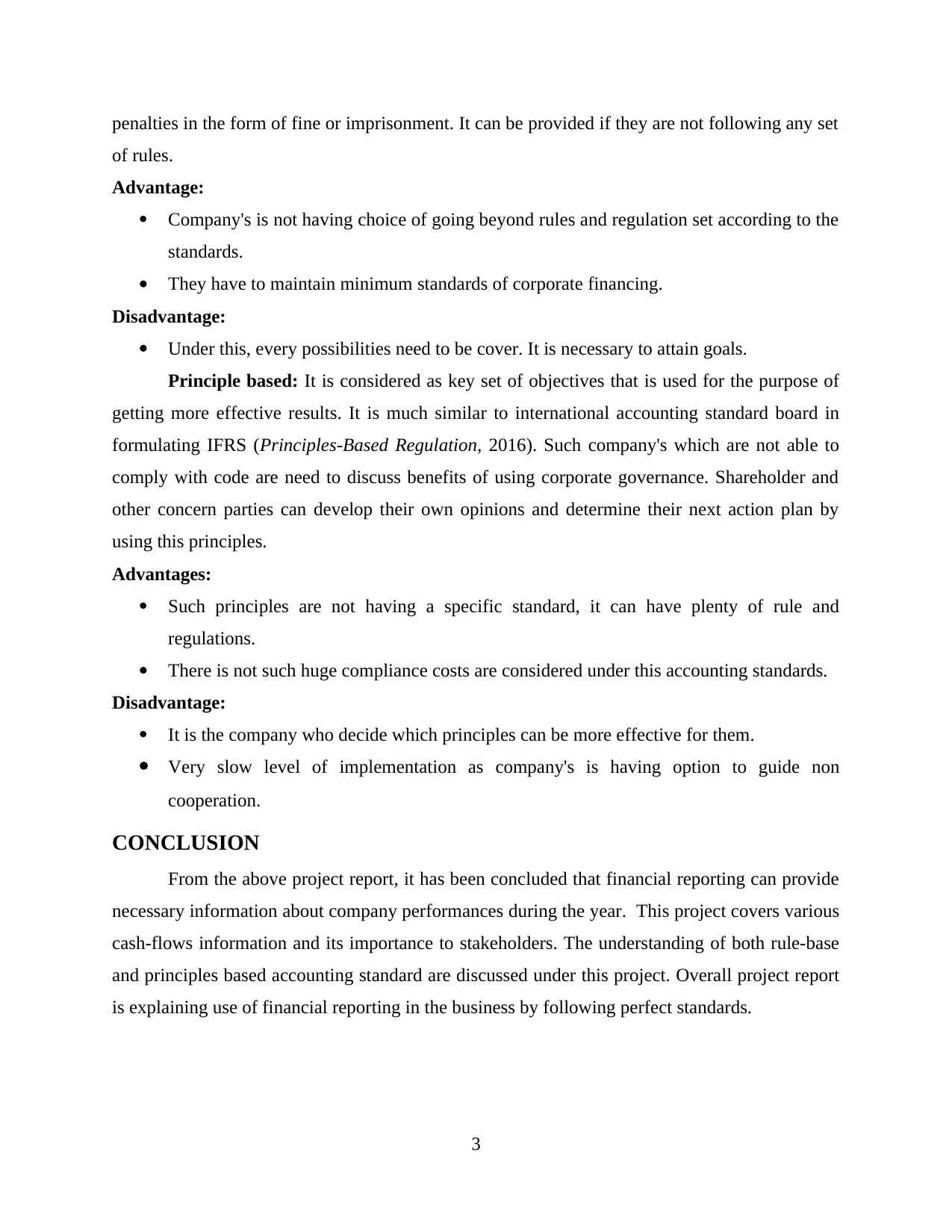
penalties in the form of fine or imprisonment. It can be provided if they are not following any set
of rules.
Advantage:
Company's is not having choice of going beyond rules and regulation set according to the
standards.
They have to maintain minimum standards of corporate financing.
Disadvantage:
Under this, every possibilities need to be cover. It is necessary to attain goals.
Principle based: It is considered as key set of objectives that is used for the purpose of
getting more effective results. It is much similar to international accounting standard board in
formulating IFRS (Principles-Based Regulation, 2016). Such company's which are not able to
comply with code are need to discuss benefits of using corporate governance. Shareholder and
other concern parties can develop their own opinions and determine their next action plan by
using this principles.
Advantages:
Such principles are not having a specific standard, it can have plenty of rule and
regulations.
There is not such huge compliance costs are considered under this accounting standards.
Disadvantage:
It is the company who decide which principles can be more effective for them.
Very slow level of implementation as company's is having option to guide non
cooperation.
CONCLUSION
From the above project report, it has been concluded that financial reporting can provide
necessary information about company performances during the year. This project covers various
cash-flows information and its importance to stakeholders. The understanding of both rule-base
and principles based accounting standard are discussed under this project. Overall project report
is explaining use of financial reporting in the business by following perfect standards.
3
of rules.
Advantage:
Company's is not having choice of going beyond rules and regulation set according to the
standards.
They have to maintain minimum standards of corporate financing.
Disadvantage:
Under this, every possibilities need to be cover. It is necessary to attain goals.
Principle based: It is considered as key set of objectives that is used for the purpose of
getting more effective results. It is much similar to international accounting standard board in
formulating IFRS (Principles-Based Regulation, 2016). Such company's which are not able to
comply with code are need to discuss benefits of using corporate governance. Shareholder and
other concern parties can develop their own opinions and determine their next action plan by
using this principles.
Advantages:
Such principles are not having a specific standard, it can have plenty of rule and
regulations.
There is not such huge compliance costs are considered under this accounting standards.
Disadvantage:
It is the company who decide which principles can be more effective for them.
Very slow level of implementation as company's is having option to guide non
cooperation.
CONCLUSION
From the above project report, it has been concluded that financial reporting can provide
necessary information about company performances during the year. This project covers various
cash-flows information and its importance to stakeholders. The understanding of both rule-base
and principles based accounting standard are discussed under this project. Overall project report
is explaining use of financial reporting in the business by following perfect standards.
3
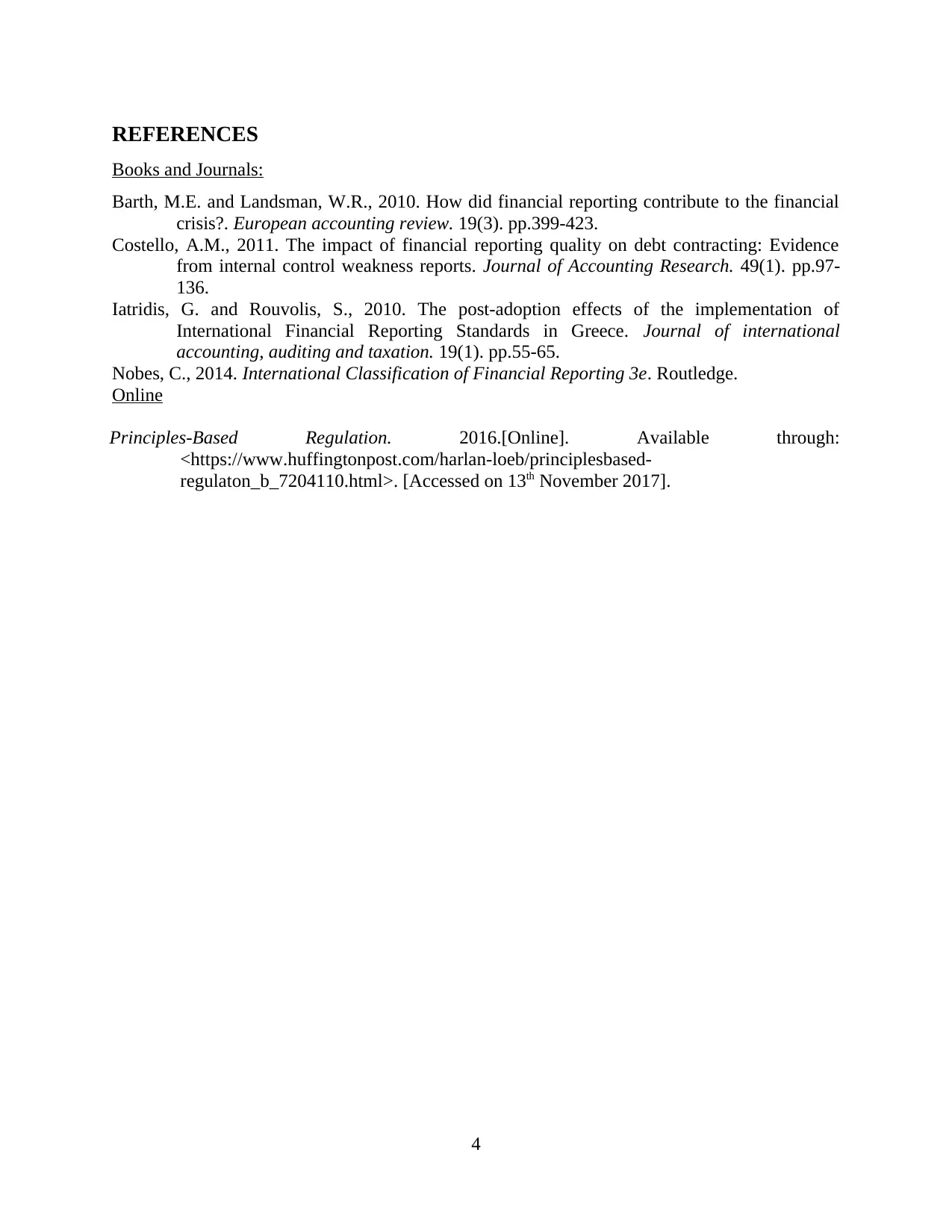
REFERENCES
Books and Journals:
Barth, M.E. and Landsman, W.R., 2010. How did financial reporting contribute to the financial
crisis?. European accounting review. 19(3). pp.399-423.
Costello, A.M., 2011. The impact of financial reporting quality on debt contracting: Evidence
from internal control weakness reports. Journal of Accounting Research. 49(1). pp.97-
136.
Iatridis, G. and Rouvolis, S., 2010. The post-adoption effects of the implementation of
International Financial Reporting Standards in Greece. Journal of international
accounting, auditing and taxation. 19(1). pp.55-65.
Nobes, C., 2014. International Classification of Financial Reporting 3e. Routledge.
Online
Principles-Based Regulation. 2016.[Online]. Available through:
<https://www.huffingtonpost.com/harlan-loeb/principlesbased-
regulaton_b_7204110.html>. [Accessed on 13th November 2017].
4
Books and Journals:
Barth, M.E. and Landsman, W.R., 2010. How did financial reporting contribute to the financial
crisis?. European accounting review. 19(3). pp.399-423.
Costello, A.M., 2011. The impact of financial reporting quality on debt contracting: Evidence
from internal control weakness reports. Journal of Accounting Research. 49(1). pp.97-
136.
Iatridis, G. and Rouvolis, S., 2010. The post-adoption effects of the implementation of
International Financial Reporting Standards in Greece. Journal of international
accounting, auditing and taxation. 19(1). pp.55-65.
Nobes, C., 2014. International Classification of Financial Reporting 3e. Routledge.
Online
Principles-Based Regulation. 2016.[Online]. Available through:
<https://www.huffingtonpost.com/harlan-loeb/principlesbased-
regulaton_b_7204110.html>. [Accessed on 13th November 2017].
4
⊘ This is a preview!⊘
Do you want full access?
Subscribe today to unlock all pages.

Trusted by 1+ million students worldwide
1 out of 6
Related Documents
Your All-in-One AI-Powered Toolkit for Academic Success.
+13062052269
info@desklib.com
Available 24*7 on WhatsApp / Email
![[object Object]](/_next/static/media/star-bottom.7253800d.svg)
Unlock your academic potential
Copyright © 2020–2025 A2Z Services. All Rights Reserved. Developed and managed by ZUCOL.




